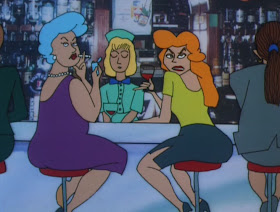
Tony Johnson, director of the 1996 crime fantasy feature Fallen Angels and the Stonehouse Reunion series, kindly agreed to be interviewed about his life and work.
LC: How did you first get into animation?
TJ: I was tired of working in news graphics at ITN and read a book by Shamus Culhane called Animation: From Script to Screen. Love at first sight. I quit my job and set up an animation school in Cardiff based on the principal: You teach best what you most need to know.
LC: How did you come to direct Fallen Angels?
TJ: Long story. I was trying to get a feature off the ground called Blackwater Rising; I met a producer called Jenny Barrett who liked the visuals but not the story. She asked me if I had any angel stories as her favourite film was It's A Wonderful Life, and I showed her a picture based on Paradise Lost. I made up a little story at the meeting about two of Satan's rebels trying to get home; it was a bit of a post-civil war western - soldiers from the losing side crossing battlefields and enemy territory on their way back to the South.
I took time out to make a documentary for S4C called Winnebago Blues about a journey across I-10 with my brother and ten friends; while I was editing in London I heard of a Japanese company called Fujisankei. I called the secretary who arranged a meeting with the Managing Director, the meeting went well but I didn't hear a word for two years.
Then I got a call from the blue and was invited to meet a lovely guy called Mister Ushikubo. They gave me a small amount of money to write the script, put together some visuals and I got my brother to record some demos; Fujisankei brought in another partner called ITEL (Now Granada) and gave me a budget of £240,000 to make the film. I got to produce and direct it because I was cheap.
Fallen Angels had mixed reviews; although I think some people missed the point I was proud of the achievement. It was the first British film commissioned at the development stage by a Japanese company and the first ever black British animated film. I thought the industry would be supportive of what we'd achieved on such a tight budget - no money for reshoots and a team of unemployed artists trained completely from scratch.
LC: What did you do between Fallen Angels and Stonehouse Reunion?
TJ: I spent the years after Fallen Angels working on other stories and sketches. A Welsh animation company optioned a project called The Island of the Dead and we were awarded £250,000 at the Cartoon Forum in Pottsdam; the development fizzled out after a couple of years so I left Cardiff and moved to London.
When Fallen Angels finished I span out a bit - my studio was robbed before I finished the film and I used the insurance money completing the last five minutes of ink and paint. A couple of months after the film was finished my company was bankrupt and I was homeless; I briefly shared a flat with a bunch of teenage villains called the Stonehouse crew. They used to go out every day and steal enough money each for a bottle of Stonehouse Cider and a bucket of mix; they all ended up in prison.
A friend paid my airfare to Oz, where I spent three months with some ten pound pom relatives. I then went to Beirut to teach for another three months at Notre Dame University.
LC: Can you tell us about the Stonehouse Reunion films? Some readers might be familiar with the first one, but may be unaware that it was actually the first in a series.
TJ: The first film was based on Shawshank Redemption. The storyboard, voices and music were recorded before I approached Channel 4; the first was financed by Channel 4 and another six were co produced with S4C. Three broadcast on TV and the others broadcast online. The second featured the voice of Howard Marks and was set in Woolangong.
They didn't turn out so good. Truth is my dad was sick and I only made them to help my mum pay the bills.
I didn't have a great relationship with the production company: as Shamus Culhane said, don't work with hacks.
LC: Who would you say your artistic influences are?
TJ: My biggest influences would have to be Don Martin and Will Eisner; I used to have a vintage Mad Magazine collection when I was a kid and used to spend all my time copying the artwork. I'm also a massive Stanley Spencer fan.
My animation is mostly inspired by Ub Iwerks, Shamus Culhane and Max Fleischer.
LC: Have you enjoyed any animation lately?
TJ: My favourite modern animated film would be Grave of the Fireflies by Takahata and my guilty pleasures would be Finding Nemo, Ratatouille and Boondocks.
LC: Any thoughts on your future?
TJ: My apparent lack of success is due to my own personal approach to my career: when I left college I was madly ambitious and as I grew up I realised there's more to life than money and success. I've probably turned down too many gigs for my own good and one mistake I made with Fallen Angels was turning a commission into a social experiment. I don't regret it though.
I haven't really had any dealings with the industry and I'm still surprised that nobody in the UK has managed to produce an independent feature length animation since Fallen Angels.































































